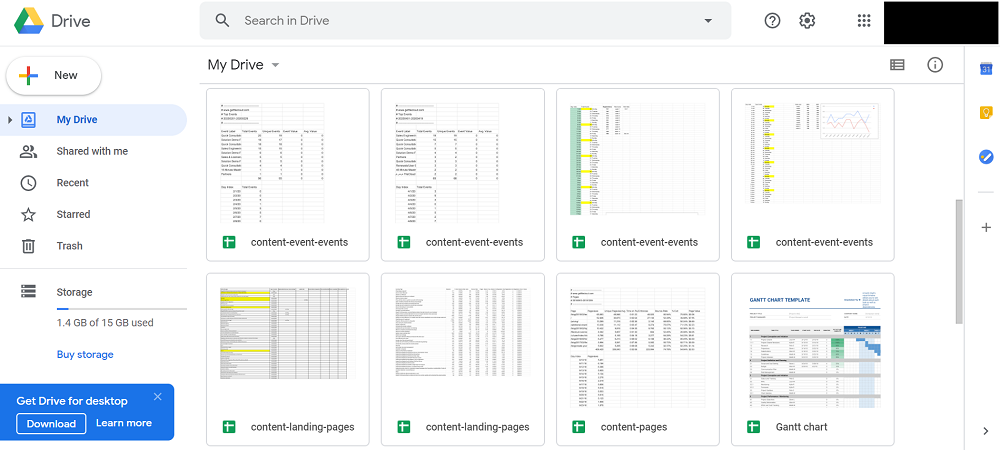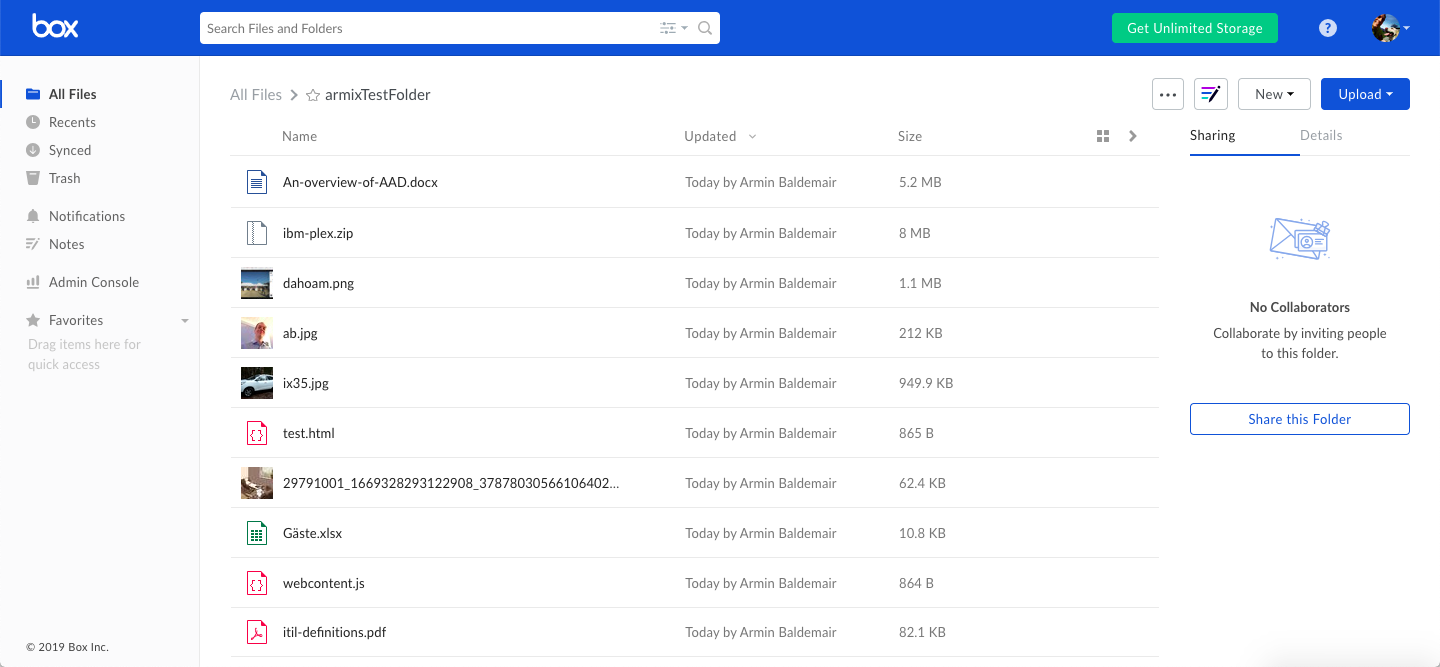FileCloud Comparison:
Featuring Citrix ShareFile, Dropbox, Egnyte, Box, OneDrive, & Google Drive
Based on public information available as of 15/05/2020; Some features only available in higher plans have been marked as “No (Upgrade Plan)”. If any information is not accurate, please let us know @ support@filecloud.com. All product and company names are trademarks™ or registered® trademarks of their respective holders. Use of them does not imply any affiliation with or endorsement by them.
Detailed Review – Dropbox Alternatives 2021
Dropbox (Business Advanced Plan)
Dropbox Business offers a cloud storage solution to businesses across the globe for data storage and data sharing. Dropbox comes with intuitive UI, desktop, and mobile apps to let you access files from anywhere. Even with cut-throat competition in the EFSS market, Dropbox is still popular, largely owning to the sheer number of businesses that use Dropbox. If you are looking for a simple collaborative tool for your firm, Dropbox is a great choice. Keep reading the article as we will dive into Dropbox’s pros and cons.
Important Features: Dropbox Business plan comes with advanced features with unlimited storage space, password protected sharing, remote wipe, dropbox dlp, dropbox file locking, 24X7 access, file recovery, file locking, granular permissions, audit logs, and much more.
Pros: Dropbox can be integrated with thousands of third-party apps that improve the existing workflow and make it more efficient. Dropbox offers an excellent collaborative workspace that can be seamlessly integrated with MS Office and Google docs. Smart sync capabilities help in storing files smartly without worrying about the storage space. Admins can monitor all the activities taking place on the cloud and make decisions regarding allowing or revoking access to the data files to the clients/users.
Cons: Dropbox certainly lacks functionality when it comes to data management and finding specific data files. It also imposes a limit of 100GB on large file sharing which is problematic for certain businesses that handle large files such as architecture firms, financial firms, etc. Many users have rated it lower on the parameters such as friendliness, data organization, login, and sync problems. With Dropbox, you can find un-informed price hike every year, forced upgrades, privacy issues, and lots of spam for upgrading products, etc. Also, end-users and admins are offered no training to make them familiar with Dropbox Business products. When you compare dropbox plans to FileCloud to learn about other cons.

FileCloud Online (Enterprise Plan)
FileCloud is one of the fastest growing file sharing solution with advanced collaboration and security features. Get unlimited storage, unlimited file size uploads, digital rights management, a clean and easy to use UI and high ROI among all top EFSS solutions. Apart from the features, FileCloud has been rated highest among Gartner EFSS content collaboration platforms and FileCloud’s customer support is also unparalleled. FileCloud security includes military grade encryption features, data governance, smart DLP and compliance.
Important Features: FileCloud offers storage and collaborative workspace which comes with unlimited free client accounts, endpoint backup, custom branding and much more. For data security, you get access to digital rights management, smart DLP, data governance, ransomware protection, device management features, automated workflows, and audit reports.
Pros: Are you looking for a feature-rich EFSS solution with a high ROI? With Filecloud you get better value as compared to other EFSS solutions. FileCloud offers an array of features which are only available at a much higher cost with other solutions. FileCloud follows major government and regulatory compliance like HIPPA, GDPR, CMMC, FIPS 140-2.
Cons: Filecloud has third-party integration capabilities, but only a handful of native integrations are available while other EFSS solutions like Dropbox have more integration to other apps at their disposal.

Google Drive (Enterprise Plan)
Google Drive is the most popular cloud storage solution with over a billion user accounts. The free version of Google Drive is good, but what about the business plan? Google Drive for business is the same as the free version but you get unlimited storage space for your business. The Google Drive works without hassles and comes natively integrated with Google apps such as Gmail, Google docs, and google sheets.
Important Features: Google Drive for business offers unlimited storage space, mobile and desktop apps, integration with MS Office, and Google apps. Apart from these, Google Drive offers features such as- e-discovery for files, email, and chats, access control permissions, mobile device management, and 24×7 data access.
Pros: With Google Drive for Business you get offline access to documents which can be useful on the go when you don’t have internet access. Since you can edit MS office files directly, it’s a nice to have feature when collaborating with MS Office daily for business files. Basically, Google Drive is as excellent as a tool can get for document collaboration and editing.
Cons: Google Drive isn’t easy to set up and certainly not easy to create a team structure. Having said that Google Drive is easy to use and operate. Some users have reported that Google Drive sometimes does not let them have complete control over documents and folders. Google privacy policy explicitly states that it collects the data that you upload on the cloud to provide you with better services.

Box (Business Plus Plan)
Box Storage is one of the top file-sharing platforms available in the EFSS market. The Box claims to serve global Fortune 500 companies in the world and has over 100,000 business customer accounts. While Box is great when it comes to integration with third-party apps for increased productivity, but many crucial features are still missing from the business plans. Let’s have a detailed outlook on the Box business plus plan and what it has in offer for us. Box is one of the leading google drive, dropbox alternatives.
Important Features: Box offers unlimited storage space, but limits file size upload limit to 5GB. With Box, you get access to G-suite and Office 365 integrations, sophisticated encryption technology, custom branding, content management tools, and audit trail reports.
Pros: Users have access to data 24×7 from anywhere across the world. Box offers automated workflows, alert notifications, third-party integrations, document management, mobile and desktop sync, and custom branding capabilities. The user interface is intuitive and easy to use and has native built-in apps like note creation and events management.
Cons: The 5 GB file transfer size limit is a problem when it comes to the Box business plus plan. Even after paying around $30K per year for 100 users, you don’t get a simple large file upload feature. Box business plus plan offers integration with only 3 apps, no HIPAA compliance, no Box governance, no DLP tools, and no Box key safe. Most of the above-mentioned plans are available on Box enterprise plan but you have to shell out more money.

Egnyte (Business Plan)
Egnyte’s business plan is costly than Filecloud, yet, they offer only 10 TB of storage space to the businesses, unlike Filecloud that offers unlimited storage space. The maximum file size that can be uploaded is limited to 10GB which is particularly not useful to the business dealing with large data files. Any business that is looking for additional features such as AD/LDAP integration, SSO, and role-based administration has to opt for an enterprise plan which means you pay more money. Since no pricing information is available for the enterprise edition, we compared Egnyte’s business plan with other EFSS solutions.
Important Features: Egnyte Business plan offers AES encryption, 2FA, remote device management, audit reports, mobile access, desktop sync, Office integration, and other premium integrations. Custom branding and automated workflows make Egnyte a popular choice among big brands, however, certain important features are missing from the business plan such as ad/LDAP integration, role-based administration, and single sign-On functionality which is provided in the enterprise edition.
Pros: Egnyte Business plan offers AES encryption, 2FA, remote device management, audit reports, mobile access, desktop sync, Office integration, and other premium integrations. Custom branding and automated workflows make Egnyte a popular choice among big brands, however, certain important features are missing from the business plan such as ad/LDAP integration, role-based administration, and Single Sign-On functionality which is provided in the enterprise edition.
Cons: Egnyte business plan offers 10 TB storage space and 10 GB max file size which is a bit problematic if your business generates huge data. If you want AD/LDAP Integration, SSO, and role-based administration then you need to opt for a higher-priced enterprise edition. Many of the users have complained about the sync issues that arise when syncing the files to the cloud as well as the additional cost that they charge for add-ons that you add to your account.

Onedrive (Office 365 E3 Plan)
Microsoft OneDrive’s EFSS solution is particularly widely used, primarily because of its native integration with the Microsoft Office suite. The Enterprise E3 plan offers a collaborative platform, security tools, powerful search capabilities. While OneDrive projects itself as a one-stop solution for the businesses, let’s find out more details.
Important Features: Office 365 E3 plan offers you complete access to office apps, Microsoft Teams, and Sharepoint. Core features include offline data access, differential sync capabilities, secure file sharing, data encryption at rest and in-transit, e-discovery tools, 24X7 access with One Drive mobile app, and many more.
Pros: The most important feature that you get with OneDrive is the native integration with the Microsoft Office suite where you get access to Microsoft Office, Word, Excel, Powerpoint, and OneNote. OneDrive for Business comes with extensive feature-offline data access, granular permissions, file sharing, syncing files, and mapping OneDrive as a network drive. OneDrive for business also offers security features- data encryption, DLP, and e-discovery.
Cons: OneDrive does not offer unlimited storage space unlike FileCloud but offers 5TB storage space to each user. Although, OneDrive is easy to use but UI is not at all responsive and intuitive and is missing a few features that make it seamless to work with. Sync fails a lot as reported by the users, UI across all the major OS are different, downloads cannot be resumed. DLP, Threat Protection, and Office 365 cloud app security is not available with the E3 plan and is only available with the E5 plan costing $35 per month.

ShareFile (Premium Plan)
Citrix’s Sharefile is a secure EFSS solution that offers flexibility in terms of functionality offered to clients. Sharefile offers seamless productivity through a mobile app, easy share options, workflows, and allows users to securely transfer files with the clients across the globe. Let’s review Sharefile about its features, usability, and pricing.
Important Features: With the ShareFile premium plan, you get access to Active Directory, Single Sign-On authentication, Outlook, and Gmail Plugins, unlimited client users, unlimited storage, custom branding, mobile & desktop apps, e-signatures, full-text search, file versioning, and much more.
Pros: Sharefile offers advanced user management features and the overall UI is rich and intuitive. Unlike Dropbox or OneDrive, sync functionality works without a hitch & file sharing is fast especially for large data files. Unlimted client user accounts are provided which helps in saving a lot of money for the enterprises. Data management is superbly arranged and managed for easy access to data files.
Cons: The third-party integrations are abysmally low when compared to other competitors. File locking capability is missing which causes the problem when multiple users are working on the same file. Data loss prevention capabilities can be used only with the help of a third-party DLP suite that supports ICAP.
Also, check out OwnCloud vs NextCloud for a detailed comparison.